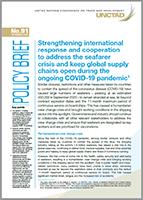
Border closures, restrictions and other measures taken by countries to contain the spread of the coronavirus disease (COVID-19) have caused large numbers of seafarers – peaking at an estimated 400,000 in September 2020 – to remain stranded at sea, far beyond contract expiration dates and the 11-month maximum period of continuous service on board ships.
This has caused a humanitarian crew change crisis and brought working conditions in the shipping sector into the spotlight. Governments and industry should continue to collaborate with all other relevant stakeholders to address the crew change crisis and ensure that seafarers are designated as key workers and are prioritized for vaccinations.
Key points:
-
The world’s 1.9 million seafarers, many of whom are from developing countries, are playing a vital role in ensuring the flow of critical goods along supply chains and keeping world trade moving throughout the ongoing COVID-19 pandemic.
-
However, border closures, restrictions and other measures to contain the spread of COVID-19 have caused a humanitarian crew change crisis, bringing working conditions in the shipping sector into the spotlight. Despite important international efforts and support, this crisis continues, and seafarers are still facing serious problems, which need to be addressed.
-
Continued concerted collaboration among Governments and all other relevant stakeholders is needed to ensure that international obligations are respected and effectively implemented and that seafarers are recognized as key workers and prioritized for vaccination. All should be working together to protect seafarers’ human rights and advance the objectives of Sustainable Development Goal 8 on decent work and economic growth, for sustainable development.


